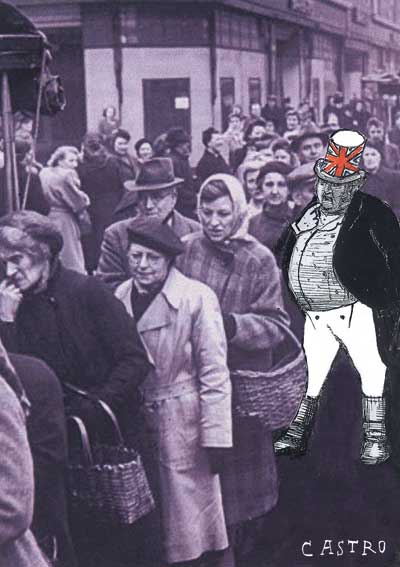It’s our foodbank’s first winter. We started collecting food and giving it to people who haven’t got any in August. Since then we have had to open two more distribution centres in our corner of Norfolk, and we have two more planned for the near future. When we started, we were the 194th UK foodbank to be founded under our parent charity, the Trussell Trust. Since then, 80 more have been set up. Between us, we have given three days’ worth of food to 100,000 hungry people in the last six months. Ours is a success story. But what sort of society needs that sort of success?
The vast majority of the food that we distribute is given by individuals, much of it at supermarket collections, when we invite shoppers to buy an extra item and give it to us as they leave. I was manning the collection boxes outside Morrisons one day when an ancient couple shuffled out, pushing a trolley stacked high with trays of cat food. They looked as if they would have fallen over if they hadn’t had something to hang on to, but as they approached the exit, the old man disengaged himself, unhooked a plastic bag that I hadn’t seen hanging on the back of the trolley, hobbled across, smiled, and gave it to me. I thanked him, and he hobbled back to his cat food and his wife. After three or four steps, they stopped, and the man made his unsteady way back to me. This time, his expression was anxious. ‘Those people you are looking after —’ he said, ‘they will be all right, won’t they?’
It was my turn to answer the phone, and the man at the Citizens Advice Bureau asked if we could do something for a mother and her 13-year-old asthmatic daughter, and do it pronto. She lived out in the sticks, and couldn’t get into town to collect a food parcel. Could we deliver one? Of course. When I got there, the house was cold, damp and dark. Mum explained that she had been passed from benefit pillar to benefit post for six weeks since she had had to give up her job because of illness, and she had no money for electricity, gas or food. When I brought in her parcel and explained that it was what nutritionists had calculated to be three days’ worth, she told me it contained more than she had long been used to buying in a week. Then she wept.
Five per cent of people helped by foodbanks are homeless, and that presents a particular challenge, as the food that we collect and distribute needs to be cooked. The first homeless person to come to us was a big man who had been living for months in a small car, and we gave him a picnic stove and a couple of pans so he could use his three-day food parcel. But people living on the streets have nowhere to store food or the kit needed to cook it on — what can we do for them? The local branch of the St Vincent de Paul charity came up with an answer: a rough sleepers’ kit, containing a boil-in-the-bag meal with a single-use chemical heating pack, a cup of coffee in a self-warming can, a bar of chocolate, a bottle of water, a carton of fruit juice, a foil survival blanket and some toiletries. It won’t solve the problem of homelessness, but in the bleak mid-winter, it might very well save a life.
Ours is a radically ecumenical Christian undertaking, and before we open a distribution session we say a prayer. Last week, it fell to me to lead it: we said the ‘Our Father’. Afterwards, one of our volunteers pointed out that between us, we had said three different versions of it. I hadn’t noticed.
A smart 4X4 drew up outside what we grandly call our ‘warehouse’ — a church hall lined with shelves of donated food. The driver, a well-dressed woman in her sixties, got out and flung open the boot. It was stacked high with goodies: cakes, fancy biscuits, mince pies, multi-packs of crisps, and nets filled with gold-wrapped chocolate coins. None of those things appear on the list of basics we invite donors to contribute. We deal in survival fare: packets of pasta and cereals, tins of vegetables and meat, cartons of UHT milk and juice. Yes, we get a trickle of luxuries given by people who want our clients not just to survive, but to survive joyfully, but we had never taken a delivery of luxuries and luxuries alone. ‘Marvellous!’ I said. ‘Thank you! Where’s it all from?’, thinking that it had been collected by a local church or school. ‘It’s from me,’ she replied. ‘The government’s just given me my winter fuel payment. But I can afford to keep warm, and there are people who can’t afford to buy food.’






Comments